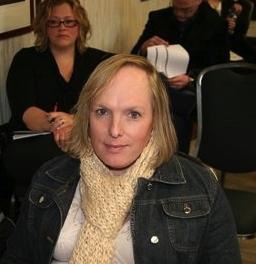Tanya Bloomfield got a handwritten note this week: “We do not want to lose you!”
This is why she is fighting to stay in Canada.
Bloomfield — born in Crawfordsburn, a small coastal village in Northern Ireland — is in bureaucratic limbo. Her application for residency has been denied. She has applied to stay as a refugee, fearing that if she were deported, she — as a trans woman — would face violence and abuse upon her return to Northern Ireland.
In October 2006, Bloomfield and her partner left Northern Ireland for Chester, a small town outside of Halifax. The couple married in Nova Scotia, and Bloomfield soon applied for spousal sponsorship for permanent residency in Canada. It was in Chester that Bloomfield found a chance to be herself.
“I only ever felt strong enough to transition here,” she says. “I’d lived in the UK and Northern Ireland, but I’d never felt comfortable, except for here.”
She says she felt truly accepted in the rural community when she first walked into her local liquor store, dressed as Tanya for the first time. She laughs as she tells the story. “I felt I needed to say something, and I said, ‘This is who I really am. They said, ‘Yeah we figured, that’s cool.’ At that point I knew it would be fine.”
After splitting with her partner in early 2009, her spousal sponsorship application was terminated. Bloomfield was able to stay in the country on her current visitor’s visa, but in August 2009, she missed the deadline to renew.
“I was working with Halifax Pride, and it was Pride week,” she says. “I was so busy, I didn’t know what day it was. I didn’t realize until it was too late that I was no longer under visitor status.” This gap in her visa was the beginning of her problems.
Because of the gap, Bloomfield had to apply to restore the status of her visa. She also applied for a temporary residence. But she says those applications were somehow lost by Citizen and Immigration Canada. Worried at not hearing anything back, Bloomfield tried to get in contact with them.
“We rang, faxed, emailed them, and we got no response,” recalls Bloomfield.
Frustrated by the lack of communication, Bloomfield filed a new application in March, asking for temporary residence as well as a work application. The missing paperwork, however, would prove to be a problem.
On July 29, Bloomfield and her lawyer, Lee Cohen, walked into the Halifax offices of Citizen and Immigration Canada. Television cameras and microphones were waiting outside for the pair as they emerged, where they told the media that Bloomfield’s applications were denied, as she did not meet the criteria. She was also asked by Citizen and Immigration to sign a voluntary departure order, which would force her to leave the country by the end of August. She refused and applied to stay in the country as a refugee.
“People have sent me research and statistics, which are compelling, about abuse that queers deal with across Europe,” she says.
Since moving to Canada in 2006, Bloomfield has forged connections to the Halifax queer community. She is on the Halifax Pride committee, and she works with trans youth at a local queer youth resource centre. She also runs her own business — a computer repair store.
Bloomfield says she has found not only a place to call home but a place that beckons for her to stay. She says that every day she receives phone calls, emails and personal visits from well-wishers, telling her they want to her stay and wondering why she would have to leave.
One card she received this week said, “I can only help by letting you know our thoughts are with you.”


 Why you can trust Xtra
Why you can trust Xtra


